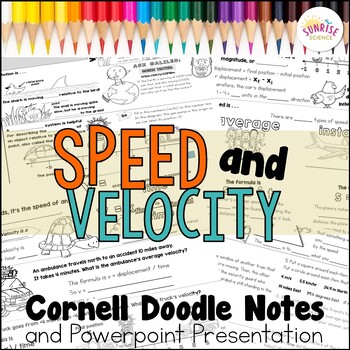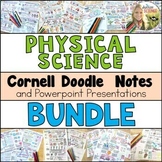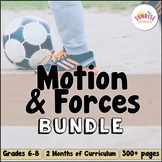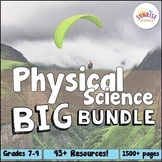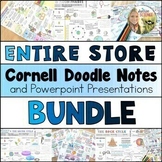Speed and Velocity Doodle Notes | Speed Formula | Cornell Notes
- PDF
What educators are saying
Also included in
- This is a growing bundle of all of my Physical Science Cornell Doodle Notes. This resource currently contains Cornell Doodle Notes and the associated Powerpoint / Google Slides Presentations for Physical Science 28 topics. The price at this point reflects only what is in the bundle at this time, pluPrice $103.00Original Price $144.12Save $41.12
- Looking for fun and engaging ways to teach your students about motion and forces? This Motion and Forces Unit is everything you'll need to teach about speed, velocity, and acceleration, forces and Newton's Laws of Motion, gravity, and orbital motion. Your students will LOVE learning about these topiPrice $48.00Original Price $60.79Save $12.79
- This is a bundle of all of my resources for teaching physical science at the middle school level! These resources include a mix of Cornell Doodle Notes, labs, demonstrations, inquiry activities, self-paced digital 5E lessons, manipulatives, projects, pixel art review activities, and assessments. IPrice $297.00Original Price $384.06Save $87.06
- This is a growing bundle of ALL of my Science Cornell Doodle Notes resources. This bundle currently contains Cornell Doodle Notes and the associated Powerpoint / Google Slides Presentations for 48 science topics. The price at this point reflects what is in the bundle at this time, plus 20% off. As aPrice $189.00Original Price $244.25Save $55.25
- This mini-bundle contains four sets of Cornell Doodle Notes for teaching or reviewing about Motion and Forces! The topics included are: Speed and Velocity, Acceleration, Forces, and Newton's Laws of Motion. Get 20% off of these resources by purchasing them in this bundle!Here are some things to knowPrice $15.95Original Price $19.80Save $3.85
Description
These no-prep, scaffolded Speed and Velocity Doodle Notes can be used to introduce motion and the concepts of a reference point, change in position, displacement, speed, and velocity. This resource can be a stand-alone lesson as it introduces or reviews the vocabulary and basic concepts associated with motion via notes and a Powerpoint. There are problem examples in the notes so students can see how to use and manipulate the speed formula. There are also practice problems in the review section! These notes provide lots of visuals and examples to help students understand this concept!
Cornell Notes are a note-taking strategy in which topic questions are written in a narrow left-hand column and definitions, explanations, and diagrams are filled in in the right-hand column.
Doodle Notes are another note-taking strategy for which pictures and graphics activate the visual pathways of the brain, which helps with retention of information when compared to standard note-taking. Your visual learners will really benefit from seeing and coloring in the pictures aside the main points of the notes!
What's Included (please see the preview also!):
- The Cornell Doodle Notes are 4-pages each and there are 2 scaffolded versions plus the answer key (in color)
- Two presentation options: Powerpoint AND Google Slides
- Google Slides version of the notes with student directions and Google Tools and Fonts sidebar
Here are some ways that I suggest using this resource:
✎ Whole-Group lesson with scaffolding : Decide which students should receive which level of the notes. Hand out the notes to the students. Use the Powerpoint or Google Slides as a presentation and talk aloud through the lesson while the students take notes OR If you have a document camera (an ELMO), you can fill out your own notes and the students can follow along with you as you discuss the concepts aloud! Stop throughout the lesson to have the students pair-share and discuss what they are learning. Allow them to color/doodle further during and at the end of the lesson.
✎ Scaffolded Small-Group lesson : Separate your students into groups by learning level. Give each student group sets of the appropriate notes for their level. Make sure each group has a device to view the presentation. Post the Powerpoint or Google Slides to your Google Classroom or other online learning platform, or email the Powerpoint version to one ‘student leader’ in each group. The students would view the Powerpoint/Slides together on one device and fill in the notes. Encourage them to add color/further notes.
✎ Individual Note-Taking or Flipped Classroom : Post the Powerpoint or Google Slides presentation to your Google Classroom or other online learning platform OR print out the slides and post them around your room -- give students a clipboard! Hand out the appropriate-level notes to each student. Students can work at their own pace to view the presentation and complete their notes. Encourage them to add color/further notes. Could also be assigned for homework or as a “half & half lab” for which one group of students is taking notes at their desks while another group is performing a lab.
✎ Distance Learning Scenario: Create a screencast lecture using one of the presentation options, or you could record audio clips over each slide that your students will play as they view the presentation.
Options for Digital Note-taking:
- Assign the Google Slides version of the notes (please view the Preview for images of what this version looks like!)
- Assign this resource using TPT's EASEL PDF Interactive Layer Tool
- Assign these notes digitally using the Kami Extension for Google Classroom. Learn about this option by downloading THIS FREEBIE!
Please note that this resource is not editable due to font and clip art licensing agreements and also to protect my work. However, you can always add additional text boxes to the presentation, as well as insert new slides with images/text/video clips, etc. to customize the lesson for you and your students!
Doodle notes is a trademarked term used with permission. Please visit doodlenotes.org for more information.
These notes support NGSS PS-2-2: Motion and Stability – Forces and Interactions: Disciplinary Core Idea MS-PS2-2: All positions of objects and the directions of forces and motions must be described in an arbitrarily chosen reference frame and arbitrarily chosen units of size. In order to share information with other people, these choices must also be shared; Crosscutting Concepts: Stability and Change.
You may also be interested in these resources:
Acceleration Cornell Doodle Notes and Powerpoint
Speed Velocity and Acceleration Problems Abracadabra Pixel Art
A Christmas Story Speed Velocity and Acceleration Problems
Motion and Forces Mad Lib Task Cards Digital or Print
Motion and Forces Back to the Future Escape Room Game
Newton's Laws of Motion Structured Notes and Demonstration Project
Newton's Laws of Motion Discovery Stations
Thanks for looking!
Sunrise Science

